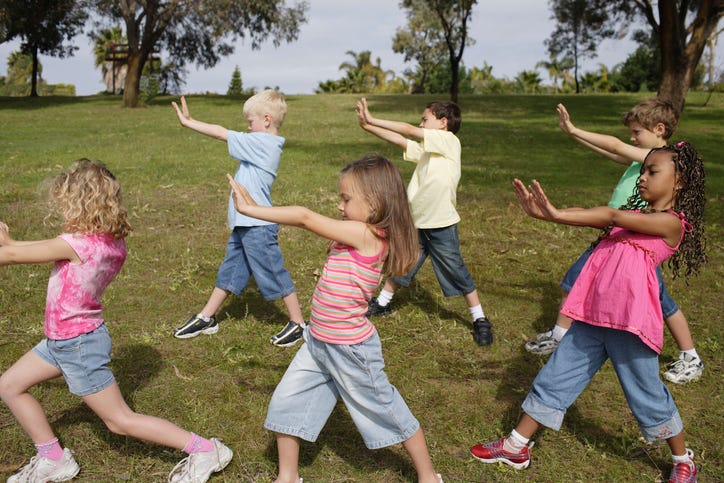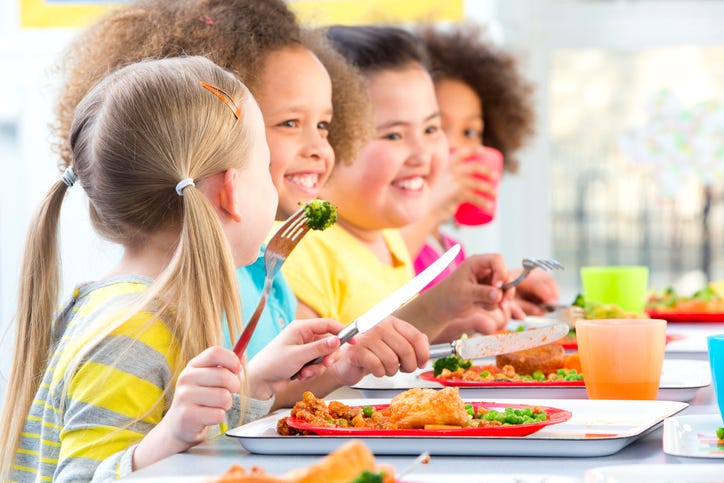What Thin Kids Need to Learn About Fatphobia
Because your body is valuable, but your value is not your body.

I gave a couple of talks last week introducing the concepts of “fatphobia,” “diet culture” and “thin privilege” to audiences who were all pretty new to this conversation. Which is not to say they’d never experienced anti-fat bias, perpetrated anti-fat bias, or gone on a diet. They were all humans, after all, with bodies, in this world that makes that so hard. But they didn’t necessarily have language for what they’ve experienced and seen. Which I see a lot, because for so long, we haven’t had a real shared language for this. And this is maybe especially true for people with thin privilege (who haven’t been paying attention to the work of fat activists and disability rights activists over the past oh, 60 years…). If your body fits pretty effortlessly into the world, then you may not have ever grappled with what it means to have a body the world wasn’t built for. You’ve never worried the airplane seatbelt won’t reach; you’ve never walked into a restaurant and realized there’s nowhere for you to sit; you’ve never gone shopping and not found your size on the rack. And you’ve never had total strangers feel free to weigh in on your body or your eating habits. You’ve never been told that you’d be happier, healthier, more successful, and just better— if only you lost weight.
Whenever I explain the concept of thin privilege, I say that parents need to educate our thin kids about anti-fat bias for the same reason that white parents need to explain racism to our white kids: Because you can’t raise color-blind kids, and you can’t raise body-blind kids. If we don’t talk about these different forms of oppression, the kids who aren’t victims of said oppression are more likely to become perpetrators. They can see that the world treats Black people and fat people and otherwise marginalized people worse than it treats white, thin, privileged people. And without our guidance, they may draw the wrong conclusions about why this happens. They may internalize that people with those culturally-conditioned privileges are somehow innately better than people without them.

But it’s also true that thin kids need to learn about anti-fat bias because this is one form of oppression that actively hurts them too. One of the talks I gave last week was for an audience of pediatric feeding therapists (it will be available as an on demand webinar from Responsive Feeding Pro in September; I’ll share more details when it’s out!). Feeding therapists work with kids who can’t, for a whole variety of reasons, eat enough, or enough different kinds of food, to grow and thrive. Many (though not all!) of the kids they work with are in very thin bodies. You might think that kids like these are the most insulated from diet culture; after all, their families are often under tremendous pressure to help them gain weight. But when my own daughter was in this camp, it felt more like we’d fallen into the funhouse mirror version of diet culture: The obsession with the scale was still there. The obsession with what and how much she ate was still there. The only difference was the goal of getting bigger, not smaller. Kids facing pressure to gain weight are still being measured by an arbitrary standard they have little control over. (Yes, you can control how many calories a kid eats if you’re using a feeding tube; no you cannot control their bodies’ biological processes to determine exactly how much weight they will gain.) And all too often, they are still being made to feel that there’s something wrong with them; that their inability to eat the way grownups want is a failure and that their bodies are a problem to solve.
Tiny kids with feeding disorders are also exposed quite directly to diet culture in the ways that adults around them respond to their size and food choices. Debi Lewis, author of Kitchen Medicine, and I talked about this when she came on the podcast a few months ago to talk about the difficult food restrictions her daughter had to live with while they were diagnosing her medical condition:
…An administrator at her school asked her how it was going. We both said it was awful. And then this administrator asked my eight-year-old daughter to make a list of all of the foods she was eating so this person could then use that list to take off her holiday weight or whatever. I said “No!” loudly in that moment and pulled Sammi away from her. And I said, "This isn’t safe. Eating this way isn’t healthy for anybody. It’s only for right now because of the complications she has had in surgery, and it wouldn’t be good for you.
Her response was, "Oh, I don’t care. As long as it helps me lose this weight." And she wasn’t the only person who talked like that.
And diet culture also showed up in other people’s reluctance for Debi to send Sammi to feeding therapy. “I heard ‘it’s not a bad thing for a girl to have a smaller appetite,’” Debi says. “And, ‘Oh she’s just petite—it’s not such a problem for a girl.’” And all of that is before you even get into therapy. Once there, parents are often anxious about the reality that when kids are progressing through feeding therapy, they usually begin with foods that are very easy to chew and swallow. My daughter lived on baby food pouches, followed by boxed mac and cheese and Fig Newtons when she was first learning to eat by mouth. The more complicated textures of meat, vegetables, and many whole grains were out of reach. Which meant I had to work through my anxieties about feeding my kid a lot of processed food. (I’ve more than made my peace with this.)
We need to be clear that all of these anxieties are rooted in anti-fat bias. We make envious comments about skinny kids’ bodies —or even meaner, teasing comments like “eat a sandwich!”— because their thinness is bringing up our own anti-fatness. We want there to be something wrong with them to make us feel better about our own failure to achieve or sustain thinness. But we also idealize their bodies, ignoring the ways that they may be the product of some struggle. We wonder if maybe we could be that thin, if we could just bring ourselves to eat the way they do.

This is painful and confusing for kids already struggling to feed themselves. It adds to the myriad of ways that food feels unsafe. But for any thin kid, the knowledge that their body size is prized by adults around them is dangerous. Because bodies change. Kids’ bodies are supposed to grow and gain weight. A thin child may not be a thin teenager or a thin adult. If we teach thin kids that their bodies are their value, then they will experience these changes as failures.
Our goal instead, should be to teach all kids that all bodies are valuable and that their value is so much more than their bodies. We need to normalize body diversity in the books, shows and art we show them. We need to name anti-fat bias when we see it, and help our kids learn to spot it and challenge it too. And we need to teach our thin kids that their body size isn’t something they need to achieve or accomplish. Because that mindset only narrows everyone’s options.
Quick shout-out for folks with an eating disorder history: Mallary Tenore, a wonderful and compassionate writer/colleague, is conducting research for her upcoming book and would love your help with this survey.
PS. Was so pleased to see another great interview with one of Mary’s co-filmmakers on Repro Rights NOW, a great Substack to be following for more on the fight for abortion rights. If you missed my chat with Mary about life before Roe, that’s here, and their film is here.




oof THIS LINE: "They may internalize that people with those culturally-conditioned privileges are somehow innately better than people without them."
Thank you very much for the opportunity to participate in the survey about eating disorders. They affect everyone of my family including the men. It is the first time I have done anything like that and I’m approaching the grandmother phase. I think it’s important to name it, describe it, and otherwise air it out for myself and for those to follow.